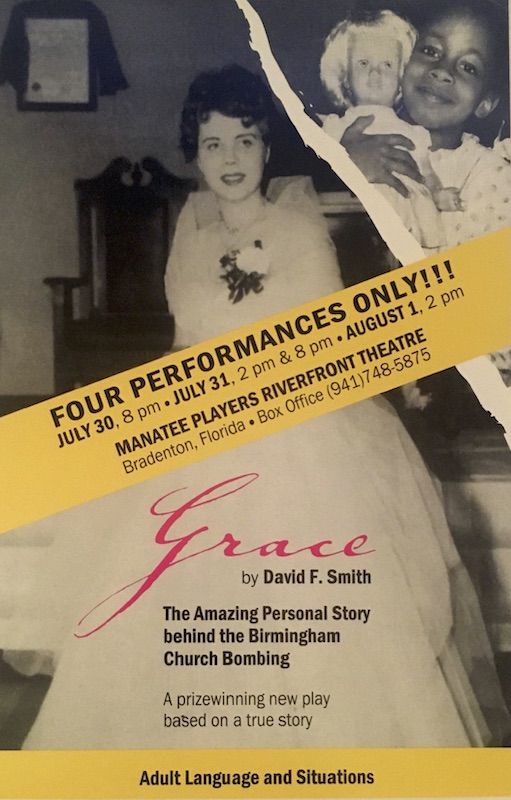SYNOPSIS: Grace
GRACE is the story of a courageous woman’s lifelong struggle to overcome the demons of her childhood and adolescence in Birmingham, Alabama in the 1950s and 1960s. Libby Cobbs is driven by an overpowering need for redemption from the ugliness and hatred that surrounded her and culminated in the bombing of the Sixteenth Street Baptist Church in 1963, in which four young black girls were killed. GRACE puts this landmark event into its tragic human context. Ultimately the play is about healing, and the power of the human spirit to overcome and redeem the tragedies of the past.
GRACE is a family story. In 1963, as King’s Birmingham campaign builds to a crescendo, Libby is 16, pregnant and alone. Her beloved aunt Tee is a mother figure to her, though Tee’s husband Chambliss, a notorious Klansman, is anathema. Tee is caught in the middle between the idealistic Libby, who has sided with civil rights demonstrators, and Chambliss, whose very identity depends on his racist beliefs. Bitter and unemployed, Chambliss plans the church bombing in an effort to impress Bull Connor and win back his job with the city, but the bomb does not detonate in the middle of the night as planned. Libby is so traumatized by the realization that a member of her own family has killed the girls that she loses her unborn child.

Libby’s quest for redemption leads her to become the first female minister in Alabama. In 1977, an ambitious prosecutor reopens the bombing case, discovers Libby’s 1963 statement to the FBI, and urges her to testify as a surprise witness against her uncle; the spirit of Denise McNair, the youngest of the four girls killed in the bombing, appears to Libby and convinces her. Libby’s testimony convicts Chambliss, a first in Alabama history, but she receives death threats and her family turns against her. Tee, astounded by Libby’s decision to testify and desperately afraid for her life, insists that Libby leave town immediately. In her travels Libby meets Joni, the narrator of the play, and in a surprising development they become devoted lovers.
Living with Joni in exile, Libby learns of Tee’s death and, visited by her spirit, vows to write a book laying bare the full extent of the racist conspiracy in Birmingham in the civil rights era. When Chambliss dies in prison, Libby has a nightmare in which she recalls being molested by him as a young girl. Impelled to return to Birmingham despite Joni’s warnings, Libby confronts the spirit of Chambliss at the grave he now shares with Tee. With intense moral force, Libby finally breaks free of his spell and wins the eternal love of Denise, whose liberated spirit comes to her in place of her own lost child.
GRACE blends history, psychology, spirituality and politics. The play is based on the life of Elizabeth Cobbs, who died in 1998. Her memoir, Long Time Coming, was published in 1994 and was cited as a significant factor in the decision to bring new indictments in the church bombing case in 2000. Stage and film rights have been obtained by the playwright.
